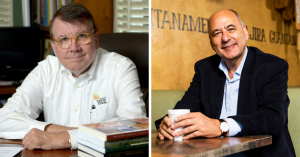
In recent days, Cuba has seen unprecedented protests and demonstrations in response to shortages of food and medicine, as well as the government’s handling of the ongoing COVID-19 pandemic. History professors James C. Clark and Luis Martínez-Fernández have provided background and insight into the recent Cuban protests to a number of news outlets.
WKMG-Channel 6 featured Clark, a senior lecturer of history, in a piece exploring whether the White House could intervene in Cuba’s current crisis. Clark shared his insight into the type of hard line that could be put into place in response to the Cuban government: “A harder line would be making it clear that we will open our doors to Cubans seeking freedom as we have done in the past, so there are a number of things [President Biden] can do, but the military option is simply not one of them.”
In an additional piece, WKMG-Channel 6 covered the history of the United States embargo on Cuba and its role in the current crisis. Pegasus Professor Martínez-Fernández offered his insight: “In Cuba, they call it a blockade. It is not a blockade. Cuba is free to trade with other countries. The problem is that Cuba does not have either the cash to do it or the credit.”
Spectrum News 13 spoke to Martínez-Fernández about the hundreds of people who have been arrested or are missing in the midst of the Cuban protests. He provided background to the numerous factors playing a role in the frustration of the Cuban people: “Lack of food…lack of medicine… We’re talking about in this situation lack of vaccines against COVID-19, and then on top of that, one of the major electrical generation plants in Cuba broke down.”
WFTV Channel 9 included insight from Martínez-Fernández in a deeper exploration of the many elements — hunger, health, anxiety, anger — that have built up over the decades and are now serving as catalysts for the demonstrations in Cuba. The piece also explores what the future may hold for the country: “I think this is the beginning of a movement in which Cubans have said, ‘Enough is enough.'”
WESH 2 covered the driving forces of the protests taking place both in Cuba and Florida in recent days. Drawing on six decades of analysis of Cuban revolution, Martínez-Fernández shared his thoughts on whether the unprecedented demonstrations are here to stay: “Whether it will change things or not, I’m not ready to prognosticate. But I will tell you one thing: There’s a very clear signal that the Cuban people will not take it anymore.”
In a Global Perspectives segment for WUCF TV, Martínez-Fernández discussed the current political climate in Cuba and provided a historical perspective to the demonstrations against the Cuban government.
Read and watch the full stories at WKMG-Channel 6, Spectrum News 13, WFTV Channel 9, WESH 2 and WUCF TV.